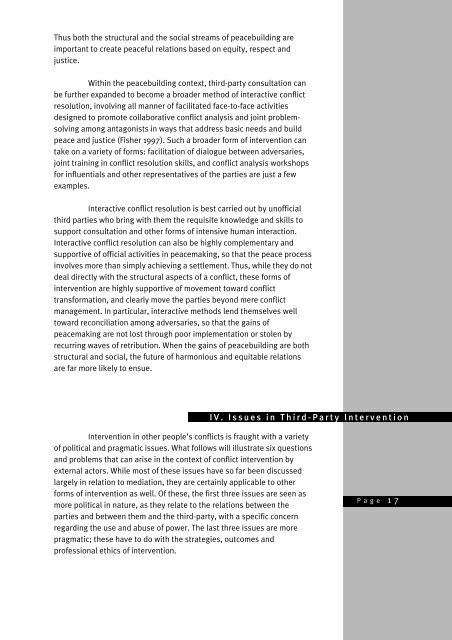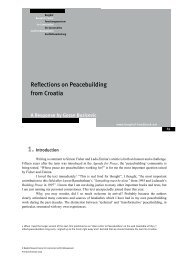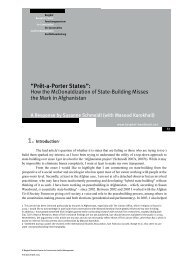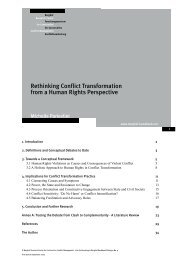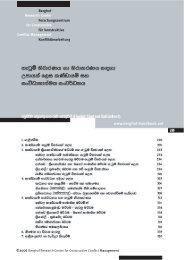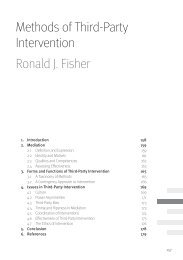Methods of Third-Party Intervention - Berghof Handbook for Conflict ...
Methods of Third-Party Intervention - Berghof Handbook for Conflict ...
Methods of Third-Party Intervention - Berghof Handbook for Conflict ...
Create successful ePaper yourself
Turn your PDF publications into a flip-book with our unique Google optimized e-Paper software.
Thus both the structural and the social streams <strong>of</strong> peacebuilding are<br />
important to create peaceful relations based on equity, respect and<br />
justice.<br />
Within the peacebuilding context, third-party consultation can<br />
be further expanded to become a broader method <strong>of</strong> interactive conflict<br />
resolution, involving all manner <strong>of</strong> facilitated face-to-face activities<br />
designed to promote collaborative conflict analysis and joint problemsolving<br />
among antagonists in ways that address basic needs and build<br />
peace and justice (Fisher 1997). Such a broader <strong>for</strong>m <strong>of</strong> intervention can<br />
take on a variety <strong>of</strong> <strong>for</strong>ms: facilitation <strong>of</strong> dialogue between adversaries,<br />
joint training in conflict resolution skills, and conflict analysis workshops<br />
<strong>for</strong> influentials and other representatives <strong>of</strong> the parties are just a few<br />
examples.<br />
Interactive conflict resolution is best carried out by un<strong>of</strong>ficial<br />
third parties who bring with them the requisite knowledge and skills to<br />
support consultation and other <strong>for</strong>ms <strong>of</strong> intensive human interaction.<br />
Interactive conflict resolution can also be highly complementary and<br />
supportive <strong>of</strong> <strong>of</strong>ficial activities in peacemaking, so that the peace process<br />
involves more than simply achieving a settlement. Thus, while they do not<br />
deal directly with the structural aspects <strong>of</strong> a conflict, these <strong>for</strong>ms <strong>of</strong><br />
intervention are highly supportive <strong>of</strong> movement toward conflict<br />
trans<strong>for</strong>mation, and clearly move the parties beyond mere conflict<br />
management. In particular, interactive methods lend themselves well<br />
toward reconciliation among adversaries, so that the gains <strong>of</strong><br />
peacemaking are not lost through poor implementation or stolen by<br />
recurring waves <strong>of</strong> retribution. When the gains <strong>of</strong> peacebuilding are both<br />
structural and social, the future <strong>of</strong> harmonious and equitable relations<br />
are far more likely to ensue.<br />
IV. Issues in <strong>Third</strong>-<strong>Party</strong> <strong>Intervention</strong><br />
<strong>Intervention</strong> in other people’s conflicts is fraught with a variety<br />
<strong>of</strong> political and pragmatic issues. What follows will illustrate six questions<br />
and problems that can arise in the context <strong>of</strong> conflict intervention by<br />
external actors. While most <strong>of</strong> these issues have so far been discussed<br />
largely in relation to mediation, they are certainly applicable to other<br />
<strong>for</strong>ms <strong>of</strong> intervention as well. Of these, the first three issues are seen as<br />
more political in nature, as they relate to the relations between the<br />
parties and between them and the third-party, with a specific concern<br />
regarding the use and abuse <strong>of</strong> power. The last three issues are more<br />
pragmatic; these have to do with the strategies, outcomes and<br />
pr<strong>of</strong>essional ethics <strong>of</strong> intervention.<br />
Page 17


